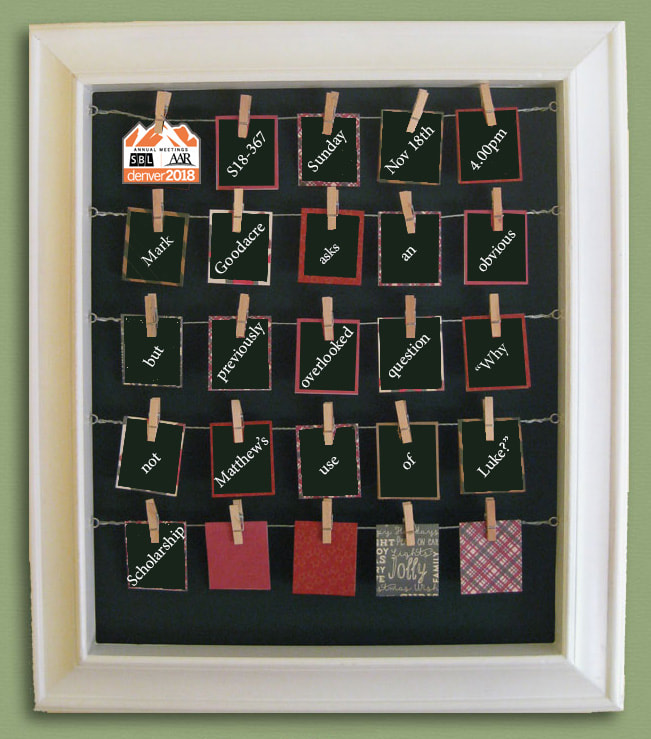| Alan Garrow Didache |
the problem page
|
The past few posts have focused on the question of the greatest weaknesses in the case for Matthew’s use of Luke – a subject relevant to Mark Goodacre’s paper at SBL this Sunday - 18th November, 2018. The reason for this focus on weaknesses is that the Synoptic Problem will come closest to being solved by the hypothesis that has the most minor, or most easily resolved, ‘greatest weakness’. In today’s post I will consider potential candidates in the case for Matthew’s use of Luke (and Mark). On Day 1, I notionally put a question to Bart Ehrman: What do you think is the best reason to reject the notion that Matthew used Luke? I asked this because, in the course of the $1,000 Challenge, Bart expressed his complete confidence that my ideas ‘simply don’t work’. What has emerged in my ongoing conversation with Mark Goodacre (at BNTC 2018), however, is that the point Goodacre made in the course of the $1,000 Challenge had no bearing on the question of whether Matthew used Luke – despite this being clearly identified as the point at issue. Nevertheless, Bart was evidently completely convinced by something. Unfortunately, I haven’t, as yet, had any luck finding out what that something was. Any help on this point gratefully received. Paul Foster in, “Is It Possible to Dispense with Q,” Novum Testamentum 45.4 (2003) 336, might be taken as suggesting that the greatest weakness of the Matthean Posteriority Hypothesis is its inability to account for incidents of Alternating Primitivity. As I have sought to demonstrate elsewhere, however (see Video 1), Alternating Primitivity, if it does indeed occur, has no bearing whatsoever on the question of whether Matthew used Luke directly. This phenomenon is only relevant to the separate question of whether Matthew and Luke might also have made use of shared sources. F Gerald Downing in, “Plausibility, Probability, and Synoptic Hypotheses” ETL 93.2 (2017) 313-337, identifies what he sees as a really critical weakness in the case for Mt3rd. It is absurd to imagine, he proposes, that a Matthew who knew of both Luke and Mark would fail precisely to copy both his sources wherever those sources agree exactly (in their rendering of strings of thirty-plus letters in sequence). It might equally be said, however, that it is absurd to imagine that Matthew would painstakingly work through Mark and Luke to identify such exactly agreeing material, no matter how incidental. Such an exercise would not only be exceptionally laborious – both when it comes to locating such passages and also when it comes to inserting such passages in Matthew’s wider narrative – but also it would run counter to an important Matthean agenda: to draw together similar-but-different teachings of Jesus (as found in various sources) into a single, carefully organised, more generally comprehensive, whole. More on this subject may be found in Days 14-17 of the Calendar. The majority of the direct and indirect contributors to this thread have settled, in one way or another, on one particular aspect of Mt3rd as likely to be its greatest weakness: the problem of omissions. That is to say, if Matthew knew Luke, why did he not make more substantial use of what Luke had to offer? This question is expressed in various ways by Verheyden (in quotation), Huggins, MacEwen and Garrow. It is an issue that also makes an appearance in the abstract for Goodacre’s SBL paper: “Matthew fails to include congenial Lucan details on politics, personnel, and geographical context.” It is true that, if it were possible to find an element of Luke’s text that Matthew would have been all but bound to include, then this would represent a serious problem. If, however, it is possible that Matthew had reasons to omit this material for the sake of economy, theology or practicality, then the problem is a good deal less marked. In addition, what may be said with some confidence is that the mechanics involved are straightforward. Of all the techniques in the author/copyist’s toolkit, the simplest is 'omit'. On Sunday 18th November at 4pm (Session S18-347), Mark Goodacre will provide a fuller explanation of what he sees as the most significant weaknesses in the case for Matthew’s use of Luke. If you’re at SBL/AAR Denver 2018, why not assess for yourself whether there is real substance to the problems he raises?
0 Comments
Your comment will be posted after it is approved.
Leave a Reply. |
AuthorAlan Garrow is Vicar of St Peter's Harrogate and a member of SCIBS at the University of Sheffield. Archives
April 2024
Categories |

 RSS Feed
RSS Feed